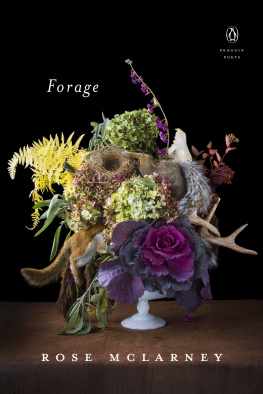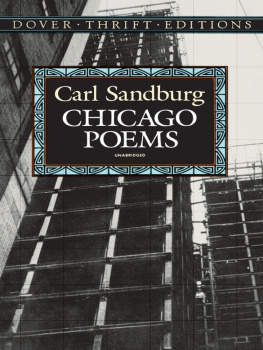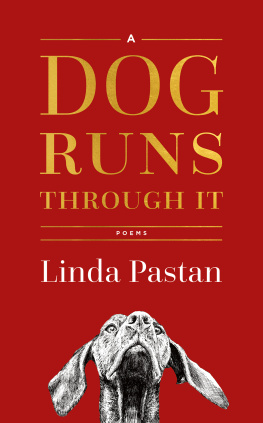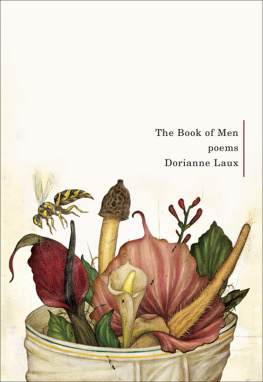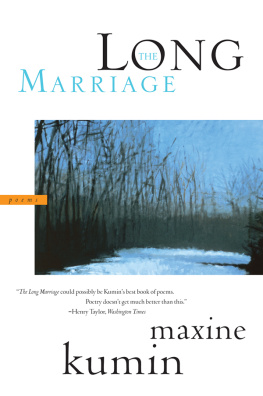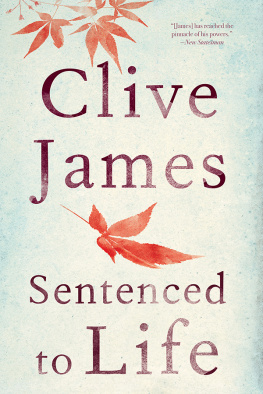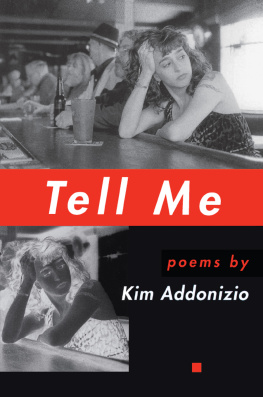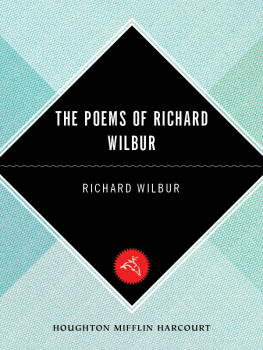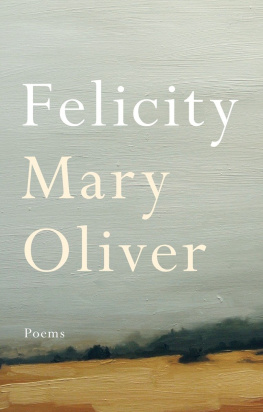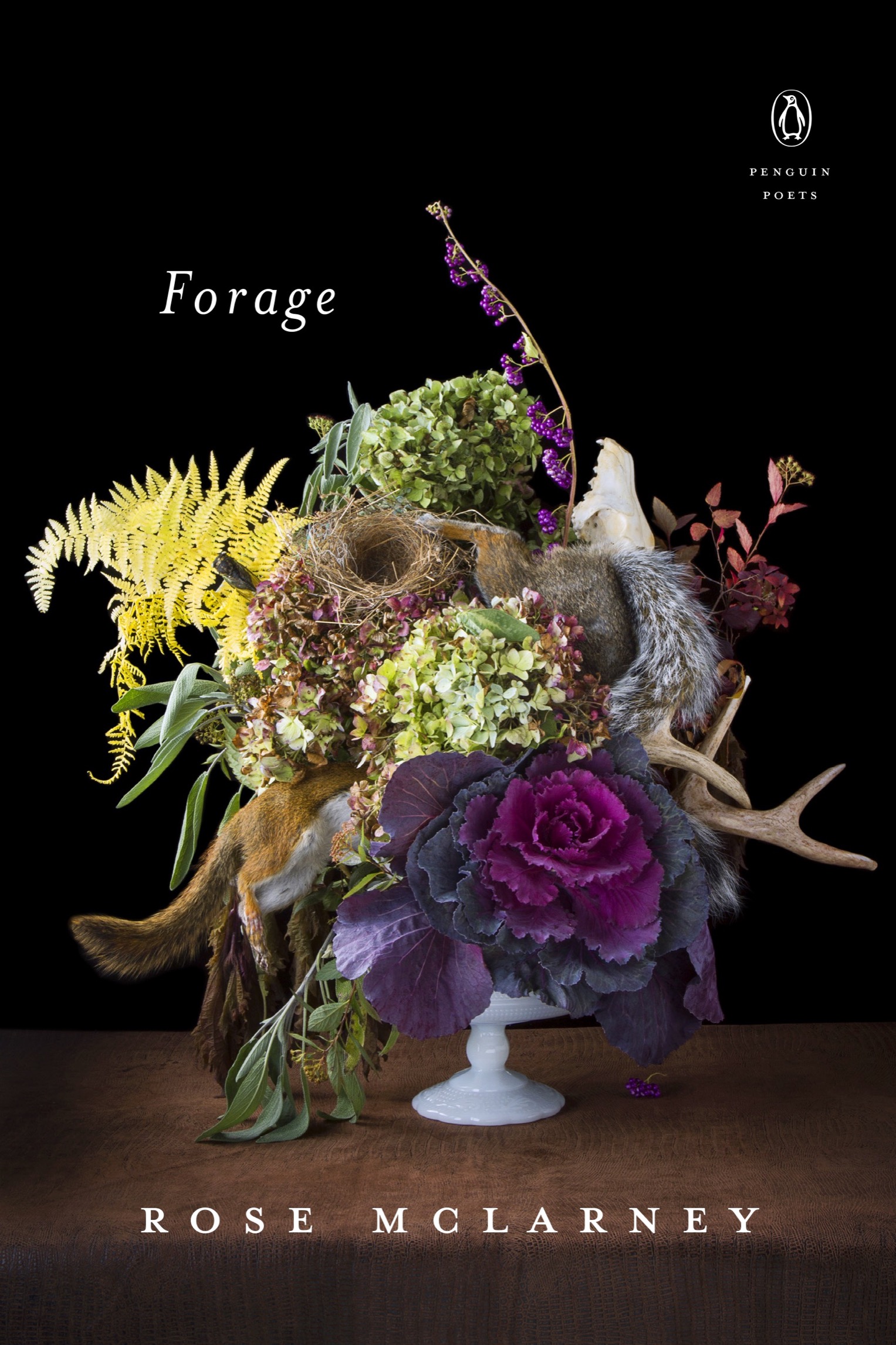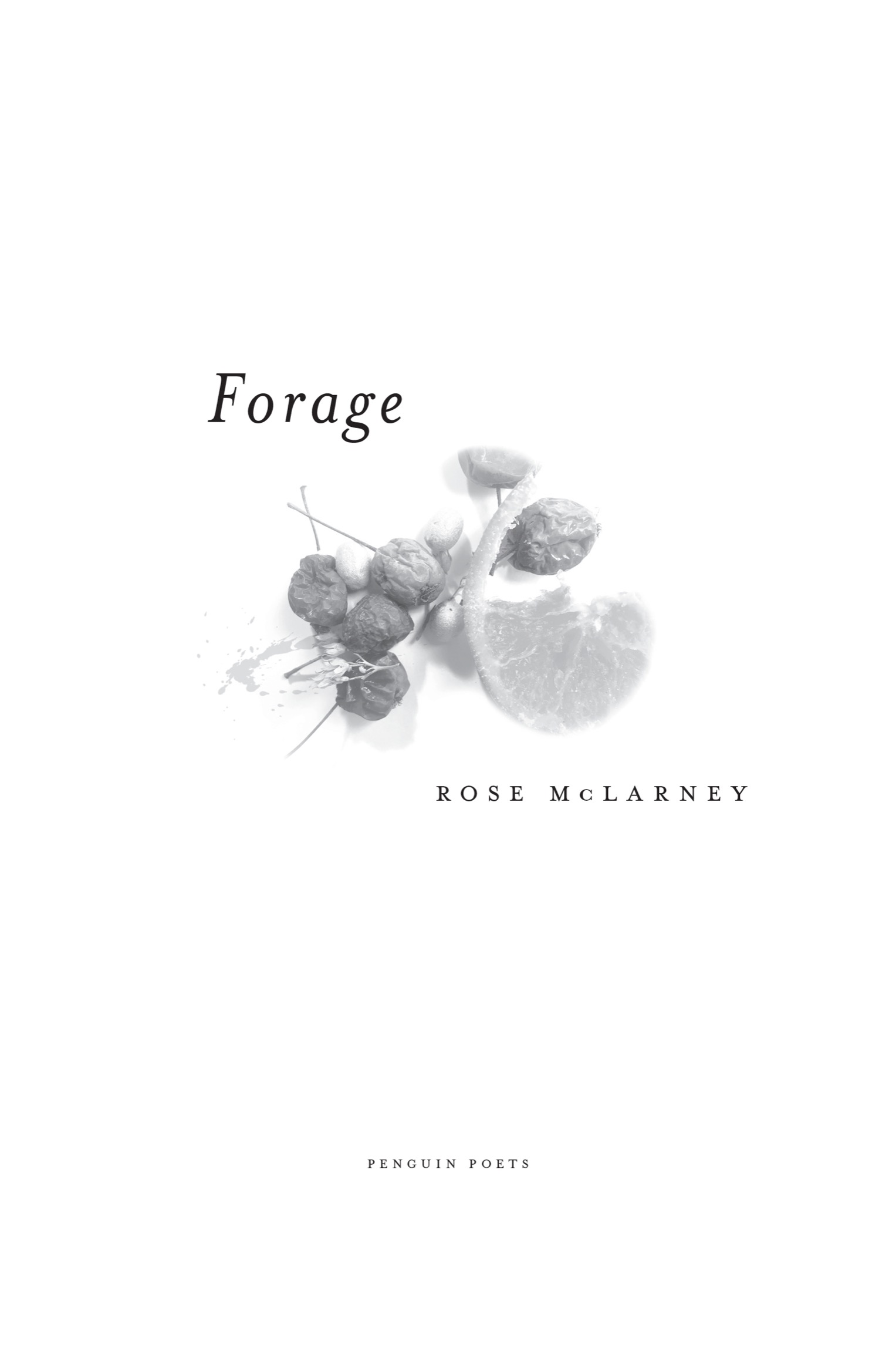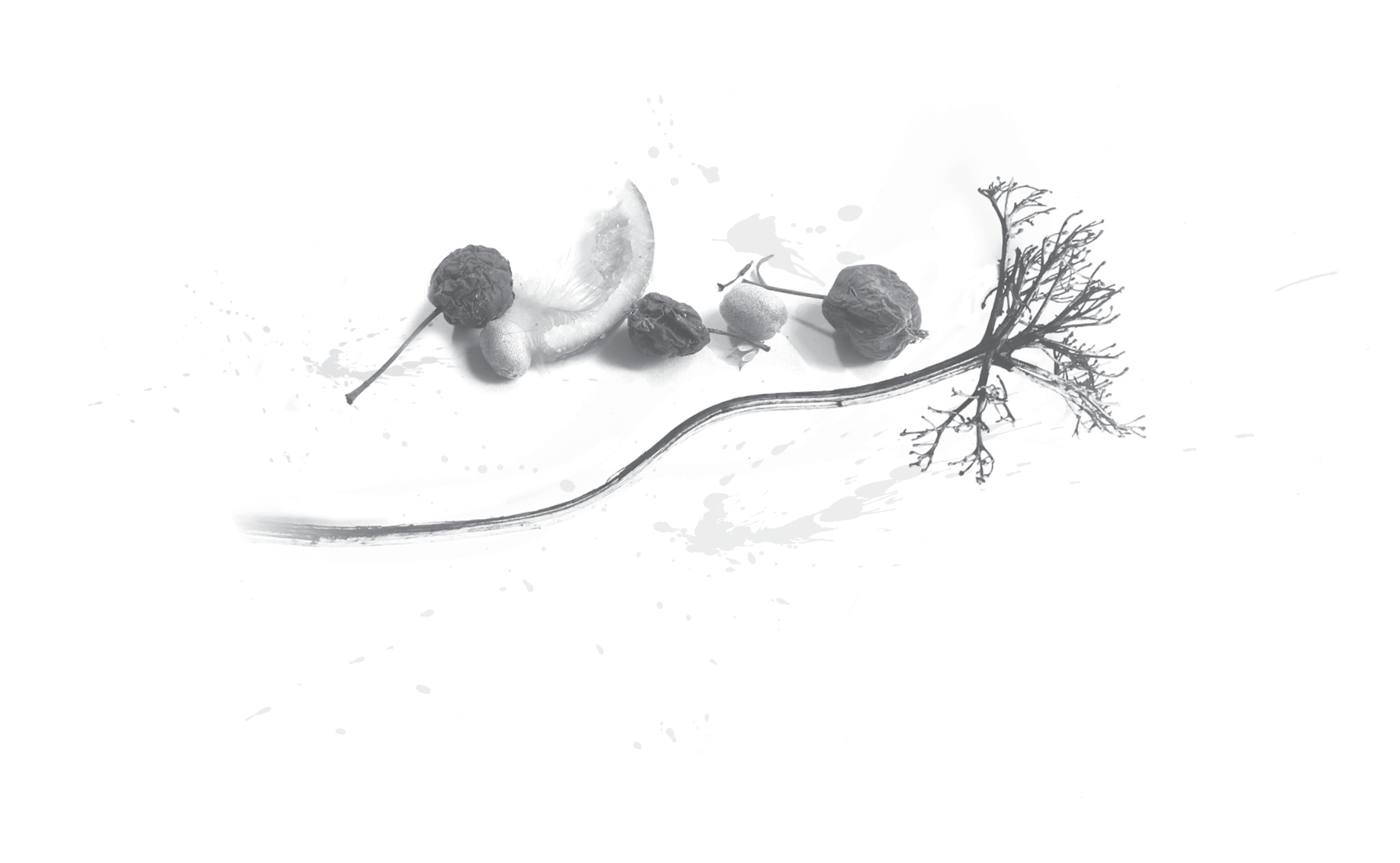ALSO BY ROSE MCLARNEY
Its Day Being Gone The Always Broken Plates of Mountains
PENGUIN BOOKS An imprint of Penguin Random House LLC penguinrandomhouse.com Copyright 2019 by Rose McLarney Photography copyright 2019 by Ginger Legato Penguin supports copyright. Copyright fuels creativity, encourages diverse voices, promotes free speech, and creates a vibrant culture. Thank you for buying an authorized edition of this book and for complying with copyright laws by not reproducing, scanning, or distributing any part of it in any form without permission. You are supporting writers and allowing Penguin to continue to publish books for every reader. constitutes an extension of this copyright page. LIBRARY OF CONGRESS CATALOGING-IN-PUBLICATION DATA Names: McLarney, Rose, 1982 author.
Title: Forage / Rose McLarney. Description: First edition. | New York : Penguin Books, [2019] | Series: Penguin poets Identifiers: LCCN 2019008922 (print) | LCCN 2019009491 (ebook) | ISBN 9780143133193 (paperback) | ISBN 9780525504979 (ebook) Subjects: | BISAC: POETRY / American / General. Classification: LCC PS3613.C5725 (ebook) | LCC PS3613.C5725 A6 2019 (print) | DDC 811/.6dc23 LC record available at https://lccn.loc.gov/2019008922 Cover design: Lynn Buckley Cover photograph: Kimberly Witham Version_1 With gratitude to Anton,
and the friends who are why I have continued to write,
and in memory of John Ervin,
who will not see this book published, but never doubted that it would be
AFTER THE REMOVAL OF 30 TYPES OF PLANTS AND ANIMALS FROM THE
JUNIOR DICTIONARYAcorn no more
. Blackberry blanked out.
Cheetah cast off. But if no
almond, because the young will use language for nature less, by that logic, no
arousal, brief surge of blood that cannot continue but lets lives be conceived.
If no bluebell because flowers are fleeting, no beauty to begin with for these bodies which wither. If no cygnet, the downy being preceding permanent feathers, then no childhood since those who are sheltered under a wing cannot stay, not the same. As we might wish mother, many childrens earliest word, will always be one they hold in mind, could we let their mouths keep mistletoe, minnow, and magpie? Leave a few things intact, allow the possibility of turning books pages back to lobster, leopard, lark, then forward to lastto lastingto live. ONE WAY OF POSING Surrogate, transfer, substitute, ersatzI set out to say something of an animal without any of that, not making it enact some strand of human behavior. Not the peaceful dove, foreboding crow, hawk standing for fierceness. The animal itself.
The awareness of nerves connected to feathers, each quill in the quiver of skin, inscribing sensation. What experience is when one is a bird, does not smell, taste, or wish to stand on the dirt much, can fly, and swim too, through wind and water with light bones. But to put an animal on the page is to still it. To care for it is to cage it. Audubon had his birds printed on the largest pages ever made, at the time. Yet the birds are contorted, curled and crushed into the corners, the images always searching out more space, the subjects too vibrant to be bound in a book.
Who doesnt know Audubon shot the birds he admired, stuffed them to make models? The birds I can study are chickens in the traffic ahead, crammed into crates, stacked on semis. The waste of their feathers blows back, and sometimes their whole bodies, in their only bone-breaking instance of flight. They lie along the roadside, bodies misshapen by breedinga great weight on their chests. Its breast meat, no metaphor. Though it speaks of us, as must all the animals, live and on legs like ours, suspended on highway sides, where habitats are cut in two. Preparing to cross, many take the same last pose, lifting one tentative paw, already, off the earth.
WINTER HARD When the forest caught fire, the horses obeyed a fear greater than what had been bred into them, broke down the stable, and stampeded for the opening in the trees, which was the lake, which was water. Of course they headed toward the alternative, liquid, unlike the material that made or was burning up the hard world they had to escape. It was the 1940s, the bombardment by Central Powers that started the fire, in Finland. This is Malapartes story. By his account, hundreds of horses sped through flames, splashed in, and the second they entered, the lake froze solid. Which makes no sense.
But never mind science. The idea stays with us. Snapthey were suspended, coated and sealed, suddenly. And singly, though the herd had entered as a whole. It could be called tragic because they were entombed, heads up, so all winter, soldiers could see the last shapes failed struggles take. It could be asserted that the animal face flared nostrils, flung mane, all frozenis a simplified expression of human experience.
Something might be said about that war, what we fight now. But to merit retelling there need not be double meaning. Its hard enough that a horse had to seek escape and was denied it, even in decay. Divisions are hard, how one side does not see itself in the other, or crystallized, cast in that clear ice. The horror of each is its own, alone. Beyond comparison, and compassion.
The soldiers are said to have walked among the horses like a sculpture garden on their smoke breaks. Casually, to be by themselves, between the bodies, they went to light their little fires. The individual mans flame was too small to make anything melt. And not even summer could turn the sharp edge of this back to water. PET The way the cat walked, stalkingEach step an extraction of himself, from the grass, unmoved. How long I watched, how I loved to watch, and how I tried to make him a little home.
But what is wanted wants to leg it elsewhere, no matter. When he was happy, he was hunting. He was hunting the exception to his silence that is what he wished to eat. He would slaughter his way back to solitude. ADMIRING AUDUBONS CAROLINA PARAKEETS Green and red and yellow and yammering, Carolina parakeets once flashed in the forests. Flocks so big they blocked out the sun.
Flocks so faithful, when one was hurt, hundreds would fly back to hover with her. Which made it fast work to shoot them all. Which was done, for feathers for hats. And by farmers whose fields their appetites had fallen upon. Splitting every apple, every pear, looking for a kind of seed that wasnt there, yet eating none. None is how many survive extinction.

